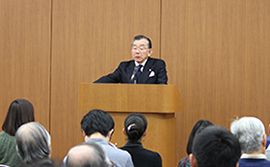This event now concluded. Report available here.
- Lecturer: Gyohten Toyoo
(President, Institute for International Monetary Affairs [IIMA]) - Date: Saturday, November 30, 2013, 1:30-3:00 pm
- Venue: Lecture Hall, International House of Japan
- Language: Only available in Japanese (without English interpretation)
- Admission: Free (reservations required)
Mr. Gyohten, who served for many years in the Japanese Ministry of Finance and was called the Japanese Mafia of Currency, will speak on where the world, and Asian countries in particular, is heading and on the current role of Japan in the world.
(President, Institute for International Monetary Affairs [IIMA])
 After graduating from the University of Tokyo, Mr. Gyohten joined the Ministry of Finance in 1955. Before he was appointed Vice Minister of Finance for International Affairs in 1986, he occupied various senior positions including Director-General of the International Finance Bureau at the Ministry of Finance and also served at the IMF and the Asian Development Bank. After his retirement in 1989 he was a visiting professor at Harvard University, Princeton University and the University of St. Gallen. In 1992 he became Chairman of the Bank of Tokyo, Ltd. (currently the Bank of Tokyo-Mitsubishi UFJ, Ltd.). Since 1995, he has been President of the IIMA and concurrently serves as Senior Advisor to the Bank of Tokyo-Mitsubishi UFJ, Ltd. He was appointed special advisor to Prime Minister Obuchi in 1998 and more recently was an advisor to the Cabinet Secretariat (special envoy to the Prime Minister). He now serves as Special Advisor to the Minister of Finance.
After graduating from the University of Tokyo, Mr. Gyohten joined the Ministry of Finance in 1955. Before he was appointed Vice Minister of Finance for International Affairs in 1986, he occupied various senior positions including Director-General of the International Finance Bureau at the Ministry of Finance and also served at the IMF and the Asian Development Bank. After his retirement in 1989 he was a visiting professor at Harvard University, Princeton University and the University of St. Gallen. In 1992 he became Chairman of the Bank of Tokyo, Ltd. (currently the Bank of Tokyo-Mitsubishi UFJ, Ltd.). Since 1995, he has been President of the IIMA and concurrently serves as Senior Advisor to the Bank of Tokyo-Mitsubishi UFJ, Ltd. He was appointed special advisor to Prime Minister Obuchi in 1998 and more recently was an advisor to the Cabinet Secretariat (special envoy to the Prime Minister). He now serves as Special Advisor to the Minister of Finance.
Report
The world underwent a great transformation from the late 1980s following such incidents as the Tiananmen Square protests, the fall of the Berlin Wall, and the subsequent end of the Cold War. Mr. Gyohten elucidated the major changes that took place using three keywords: “globalization,” “financial capital and information as pivotal factors in economic predominance,” and “power shift.” One consequence of globalization, he said, has been that economic crises now have an immediate impact around the world, compelling countries and companies to constantly remain vigilant of external risks. As the IT revolution has freed up the information that had been monopolized by those “at the top,” the basis for effective global governance has increasingly been shifting to “transparency” and “accountability.” Disparities between the haves and have-nots have grown owing to structural changes in society, triggering not only social unrest but a backlash against and growing distrust of democracy and market principles.
 How should these transformative trends be addressed at the national, corporate, and individual levels? Taking the case of Japan, Mr. Gyohten emphasized the importance of maintaining and enhancing “comprehensive national strength,” built on the balancing of economic, defense, diplomatic, technological, cultural, notional, and other assets. He also cited the importance of thinking about Japan’s role and position in the global context, particularly within Asia, in geopolitical terms. Given the broadening, global reach of corporate operations, companies, he noted, need to foster a heightened awareness of their identity, including their national roots, the markets in which they operate, and the products and services they offer. As for individuals, becoming an effective global leader requires that they develop an enthusiasm for communicating with people around the world. This, though, he concluded, is a task that must start with a better knowledge of one’s own country, one’s company, and themselves.
How should these transformative trends be addressed at the national, corporate, and individual levels? Taking the case of Japan, Mr. Gyohten emphasized the importance of maintaining and enhancing “comprehensive national strength,” built on the balancing of economic, defense, diplomatic, technological, cultural, notional, and other assets. He also cited the importance of thinking about Japan’s role and position in the global context, particularly within Asia, in geopolitical terms. Given the broadening, global reach of corporate operations, companies, he noted, need to foster a heightened awareness of their identity, including their national roots, the markets in which they operate, and the products and services they offer. As for individuals, becoming an effective global leader requires that they develop an enthusiasm for communicating with people around the world. This, though, he concluded, is a task that must start with a better knowledge of one’s own country, one’s company, and themselves.